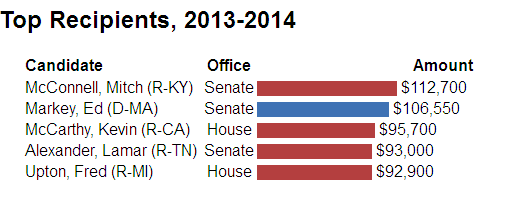(When Big Pharma owns a state. Senator Lamarr Alexander from Tennessee, high ranking and powerful, was the fourth highest recipient of Big Pharma campaign "contributions" in 2013-2014. Tennesseans take second billing as the most over-medicated people in the US. More prescriptions per capita are written in Tennessee than in 48 states. According to Pro Publica's "Dollars for Docs," Big Pharma owns influential Tennessean medical professionals, paying them millions of dollars to salute and advocate the newest Big Pharma drugs to their fellow professionals and professional associations. In 2009, key Tennessee doctors received about $8mil for Big Pharma advocacy. In 2012 , doctors nationwide received $2 billion in direct payments and gratuities from 15 big drugmakers.)
Medical Marijuana And The Need To Leave Tennessee
by Abby White
Jan 23, 2014
Tennessee families with seriously ill children are fleeing the state for Colorado, where they'll have access to medical marijuana. The Mattison family left Nashville last week, and are settling into Colorado Springs with their three children, Neal (10), Sam (7) and Millie (22 months). Millie has been suffering infantile spasms since she was three months old and is already taking an adult dosage of her current medication. When her doctors wanted to increase the dosage further — with little hope for improvement — the Mattisons started researching medical marijuana.
Why?
Part of the answer, from today's Scene piece:
Millie sees a neurologist at the Neurometabolic Clinic at the Cincinnati Children's Hospital every three months. Between visits to Cincinnati, Millie frequents the emergency room at Vanderbilt. But the cause of her seizures is still unknown.
She's endured intubations, blood transfusions, spinal taps, MRIs, CAT scans, genetic testing and stints in the pediatric intensive care unit, one due to kidney shutdown from an anti-seizure ketogenic diet. She's been on as many as 11 medications at one time and relies upon a feeding tube. Her current medication, Sabril, leaves her lethargic and has severe potential side effects, including blindness.
"One study we looked at said that if two anti-epileptics don't work, there's a 10 percent chance that any of them will work," Penn says. "If four don't work, there's a 0.8 percent chance. We've been on six. Nothing has really helped that much. She sleeps 20, 22 hours a day — there's no way she can build any muscle tone or development skills.
Although HB 1385, also known as the Koozer-Kuhn Medical Cannabis Act, was presented by state Rep. Sherry Jones (D-Nashville) on 07 January, it stands little chance of passing. (courtesy of Big Pharma)
Paul Kuhn, whose wife Jeanne found relief in medical marijuana before she passed away from cancer in 1996, is the former national chairman of the lobbying group National Organization for the Reform of Marijuana Laws. Despite the current political climate and opposition to the bill, Kuhn, who continues to serve on NORML's board, is optimistic about HB 1385.
"It will pass," Kuhn states, with a confidence many sympathetic voters don't share. "We're very close to the tipping point. There will be, this year, probably five to eight additional states that pass. So do we want Tennessee to be holding up the rear? It doesn't do our state image any good to be the laggers in a very progressive movement."
On Monday, January 27, a symposium "Koozer-Kuhn: Re-establishing a Medical Cannabis Program in Tennessee" will be held at Vanderbilt Owen School of Management from 7-8:30 pm, featuring speeches from legislators and patients. This is an 80-seat hall and audio will be broadcast in adjacent rooms to handle overflow.
Big Pharma

